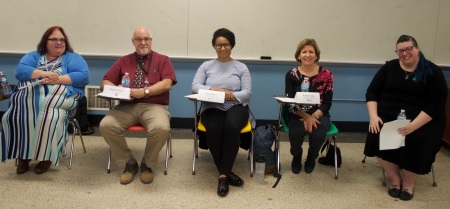Publications October 2018
Suzanne Brown was on a national task force that helped develop Specialized Practice Curricular Guide for Trauma-Informed Social Work Practice, the latest resource in the 2015 Educational Policy and Accreditation Standards (EPAS) Curricular Guide Resource Series. Published by the Council on Social Work Education and Fordham University Graduate School of Social Service, this new curricular guide confirms trauma-informed practice as an essential component of social work education and provides competency information and tools to prepare future social workers for today's specialized practice demands. The guide can be found here.
The most recent edition of Academic Advising Today, the e-publication of NACADA: The Global Community for Academic Advising, features an article by Shantalea Johns and Helen Wilson titled There is Power in Numbers: Utilizing Group Advising to Promote Student Success. The article can be found here
Kral, M. J. (2018). Case study: Research with Inuit in Arctic Canada. In In S. Banks & M. Brydon-Miller (Eds.), Ethics in participatory research for health and social well-being. New York, NY: Routledge.
Victor, B. G., Resko, S. M., Ryan, J. P., & Perron, B. E. (2018). Identification of domestic violence service needs among child welfare-involved parents with substance use disorders: A gender-stratified analysis. Journal of Interpersonal Violence. https://doi.org/10.1177/0886260518768569
Patterson, D., Day, A., Vanderwill, L., Willis, T., Resko, S.M., Henneman, K., & Cohick, S. (2018). Identifying the essential competencies for resource parents to promote permanency and well-being of adolescents in care. Children and Youth Services Review, 88, 457-466. https://doi.org/10.1016/j.childyouth.2018.03.041
Associate Professor Richard Smith is an invited speaker at the "International Conference on Global Dynamics of Social Policy" to be held Oct. 25-26 at the University of Bremen, Germany. He will be presenting a paper coauthored with Sergio J. Rey of the University of California, Riverside entitled, "Spatial approaches to measure subnational inequality: Implications for Sustainable Development Goals." This paper shows ways to locate where inequality clusters in countries and whether inequality is changing over time. It provides ways to think about cross-national issues related to social policy
The Social Work Student Research Community hosted a panel of Detroit-area social workers to talk about how they use research evidence in their social work panel. Participants of the panel (below) were:
• Patti Dixon, University Counselor III, Counseling and Psychological Services (CAPS) at Wayne State University.
• Skip McClatchey, Wayne State University Adult HIV/AIDS Program.
• Erica Searcy, Community and Resident Services Manager in the Office of City Council Member Raquel Castañeda-López.
• Roberta Walker, a behavioral health consultant and trainer working with the Michigan Department of Health and Human Services.
• Jennifer Schwartz, Lead Clinician at HELP- (Health Emergency Lifeline Program) and Corktown Health Center, the first LGBTQ integrated behavioral/health center in Michigan
The panel discussed how they came to appreciate research evidence in their social work practice, how they find evidence, barriers to accessing evidence and advice for social work students entering the work force. The event was attended by 60 students and faculty. For additional information about the event and/or the Social Work Student Research Community, contact Caitlin Brown (caitlinmb@wayne.edu) or Neva Nahan (n.nahan@wayne.edu). 